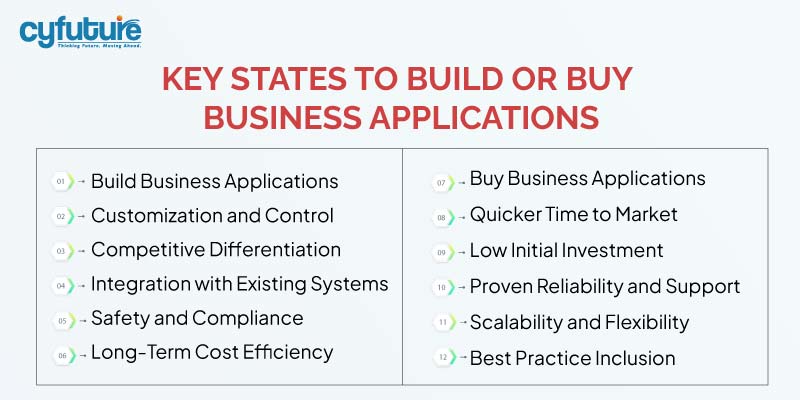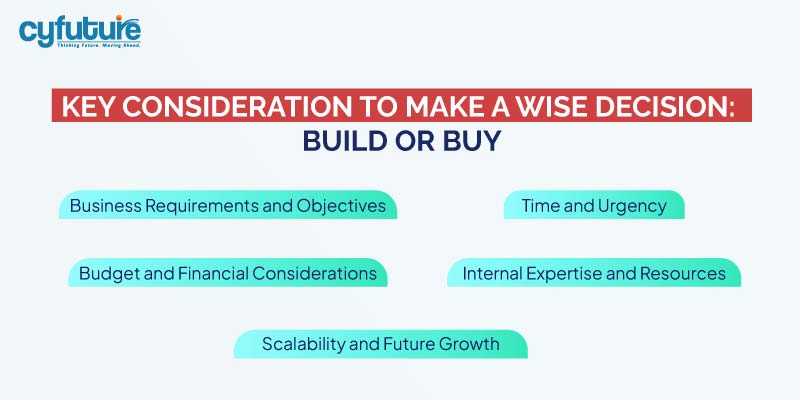-
Get Cloud GPU Server - Register Now!
Toggle navigation

With the constantly changing digital environment, businesses continuously seek ways to streamline operations, enhance productivity, and maintain their competitive advantage. Entrepreneurial pursuits at the heart of this involve the implementation of robust business applications that address organizational needs.
However, one critical decision that faces business leaders in this respect has to do with whether to buy or build business applications. This point epitomizes cost, time, customization, and scalability.
The purpose of this comprehensive blog piece is to introduce the reader to the different nuances of this very decision-making process while weighing the benefits and negative aspects associated both with building and buying business applications.

A primary advantage of building a business application from scratch is that it provides an unparalleled degree of customization. When you build an application in-house, full control lies at your discretion regarding its features, functionalities, and user interface. Thus, it is you who can fit the application to your exact business needs, making sure it aligns without friction with other existing processes and workflows.
Furthermore, you can also make changes and enhancements at will, when in control of the source code, as your business dictates, instead of being held hostage to the limitations set by third-party software.
Differentiation can give you an edge in a highly competitive market. Custom-built applications offer functionalities that may be unique and set your business apart in the eyes of your customers.
Design such a bespoke solution to combat real pain points and realize unexploited opportunities that can help further improve operational efficiency and customer experience. Proprietary technology can thus be used to create a differentiated value proposition that appeals specifically to targeted customer segments.
Another reason it just makes so much sense for an application to be in-house is the seamless integration with systems currently in existence. Most companies use a very complicated ecosystem when it comes to software applications, and seamless operability ensures that things will move along as efficiently as possible.
When you’re building an application yourself, you can keep the idea of integration at the core of your design. That means the flow of data and communication between systems will go on seamlessly without further risks of compatibility issues or challenges associated with data silos when off-the-shelf software is deployed.
Security and compliance are the major concerns in this digital era. While developing your application in-house, you are fully in power and control over its security protocols and compliance.
You can employ higher levels of security, like encryption, authentication, and access controls, as per your needs. Furthermore, the application can be made compatible with industry regulations and standards that will reduce data theft and other possible legal consequences.
Although developing a custom application may require a rather high initial cost, it is cost-effective in the long term. For one thing, custom applications eliminate recurring licensing fees that are usually required by commercial software.
You are also free to scale up the application as your business expands without paying more money for added licenses or modules. The application is therefore very scalable, meaning it will grow with your needs, not outpace your pocket.
As a business, in general, is moving at a rapid pace, time becomes one of the most important resources. The off-the-shelf applications are immensely viable since they can be implemented sooner, which gives organizations almost immediate results of deployment.
Such applications would be ideal for any organization with pressing business needs or those who wish to take advantage of emerging opportunities in the market.
Acquiring a commercially off-the-shelf business application requires less initial investment compared to developing the same in-house. The software vendor develops, tests, and maintains the application; hence, businesses can enjoy the benefits of advanced technology at much less cost than they would have incurred in case they had developed their solution. This comes in handy for those SMEs with small budgets.
Commercial business applications are developed by established vendors that have a history of reliability and performance. They have high amounts of money invested in research and development, which assures that the software is strong, secure, and up to date with all the latest technological standards.
In addition to that, there are comprehensive support services available, like technical support, frequent updates, and patches, services that may prove invaluable for those businesses that lack in-house IT expertise.
Modern commercial business applications are designed to be scalable and flexible. Many vendors offer modular solutions that can be customized to meet the different needs of various businesses, scaling up or down as required.
This provides the ability for organizations to begin with basic packages and add functionalities over time as needs develop. Cloud-based applications, in particular, are highly scalable, with businesses easily ramping up or down depending on demand.
Most proprietary business applications are designed with best practices already embedded and even functionalities specific to industries. Such best practices and industry functionalities result from immense research and consultations with industry experts.
Thus, making the software up to recent standards and best practices. Once this is put into proper practice, businesses can smoothen their operations, raise efficiency, and deliver superior results without necessarily reaching a wheel-inventing phase.

The decision to either build or buy an enterprise application is not a one-dimensional decision. Serious consideration of business needs, budget, timeline, and resources has to be made. In helping to make such a business decision, let’s look at these factors a bit more closely.
The first thing to do, in determining whether a business application should be built or bought, is to outline and clarify one’s business needs and objectives.
Understanding the answers to such questions helps one verify if a specially built solution would serve their one-of-a-kind needs, or whether a commercially available application has the needed functionalities.
Budget is also one of the major influencing factors in making build vs. buy decisions. Custom development can be expensive, especially for complex applications that require a lot of time and resources.
Detailed cost analysis should be performed, considering not only the initial cost of development but also ongoing maintenance, support, and scalability expenses. On the other hand, commercial applications, although cheaper to implement, include ongoing license fees, and may require modifications and integration at additional costs.
Another critical factor involves the urgency of your business needs. In case something is urgently required to be up and running, a commercial application might be superior since it offers faster time to market.
Depending on the respective complexity involved in building an application from scratch, it may take several months to several years. On the contrary, if time is not a constraint, with the capability of investing in a custom solution, application development provides superior long-term benefits.
After all, making this decision needs an adequate assessment of the internal competencies and resources.
In case not, buying a commercial application that can offer vendor support may prove to be an easier way out. Other alternatives include finding a reputed App Development Service provider with which you can share your expertise.

Scalability is perhaps one of the most important aspects of any business application. If your business is growing, then your application should expand with the increasing demands and requirements. Out-of-the-box applications are less flexible, while custom-built applications can be scaled more easily since they are fit to your needs.
However, there are a lot of commercial applications too, which can provide scalable solutions, especially on the cloud, where scalability can be achieved by scaling up or down based on usage and requirement. This means you have to evaluate both approaches to see what your scalability options are with each, to make certain your selected solution will meet your long-term growth.
Last but not least, whether to buy or build business applications involves an in-depth analysis of a wide variety of factors that are intrinsic to the goals, capabilities, and future direction of your organization. Business Application Services leverages bespoke solutions that will precisely fit unique operational needs and drive unmatched customization, control, and competitive differentiation. Such custom-built applications will be integrated seamlessly with running systems for enhanced security and compliance, and perhaps long-term cost efficiencies, though there may be a higher initial investment.
On the other hand, leveraging off-the-shelf App Development Services offers quick deployment, lower upfront costs, and provides reliable well-supported solutions embedded with industry best practices. Such commercial applications will be able to scale easily and are flexible to meet altering market demands and operational changes for an organization.
Ultimately, this is a call that requires intimate knowledge about what exactly your requirements are, what the budgetary bounds are, how urgent it is, and what technical acumen resides within the organization.
Given the proper calculation of these variables, you’ll find the right way to success; be it via tailored precision afforded by a custom-developed solution or be it via the assurance of speed and economy in deployment when using a prebuilt application. The outcome will ensure that the selected alternative represents compatibility with strategic goals of long-term growth and operational excellence.
In creating your strategy to buy or build your next business application, consider your specific business needs, budget, timeline, available resources, and the need for customization. Consider scalability, security, and support options with each alternative. Engage a Business Application Services provider to build clarity on which option aligns best with your strategic goals.
Business Application Services can provide an in-depth analysis of your business needs, budget, and resources. They can give recommendations about the feasibility of build versus buy by supporting the cost-benefit analysis, and advising on long-term implications for both options. Their expertise ensures that you make a well-informed decision regarding the same and is aligned with your business goals.
While most of the off-the-shelf applications provide various levels of customizing capabilities, they cannot effectively fulfill specific or unique business needs. Moreover, with this customization capability, both the cost and complexities increase. In such cases, where heavy customization is required, it would make more economic sense to have a tailored application developed. App Development Services can help in evaluating the capability and limitations of off-the-shelf solutions regarding customization.
Another important consideration in building versus buying a business application is scalability. A custom application can be developed with future expansion, so scaling the application is easier. Many commercially available applications may not scale well, although there are options for scalability in many modern solutions. Business Application Services can help assess your scalability needs as a business and recommend the right solution for you.
Yes, Business Application Services lays great emphasis on security when the development process is at its initial stage. They follow strong security measures, thorough testing, and compliance with industry standards. Be it build or buy, the services are capable of assessing off-the-shelf applications regarding their security features and integrating advanced protocols for custom-built solutions to protect your business data and operations.